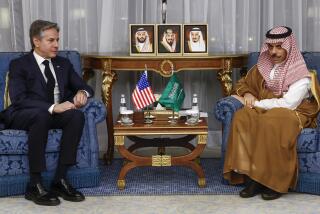Soviet Foreign Minister Heads for Mideast Today : Diplomacy: Bessmertnykh will be carrying a peace initiative. He also is expected to discuss restoring relations with Israel.
- Share via
MOSCOW — Soviet Foreign Minister Alexander A. Bessmertnykh heads for the Middle East today with a peace initiative and also, most likely, keen hopes of restoring diplomatic relations with Israel after nearly a quarter-century break.
“The purpose of the visit is to attempt to launch the process of a Middle East settlement,” said his spokesman, Vitaly I. Churkin. “We think that will be the main topic of his visits to Middle East countries, including Israel.”
Although Bessmertnykh plans to visit Syria, Egypt, Jordan and possibly Lebanon, the high point of the trip will be a six-hour stop in Israel on Friday to consult with officials on new strategies to bring about a settlement of the Israeli-Palestinian conflict.
Bessmertnykh, who will become the highest-ranking Soviet official to visit Israel in its 43-year history, is also expected to discuss prospects for resuming formal diplomatic ties with Israel. They were severed by Moscow after the 1967 Six-Day War.
“There is no timetable for re-establishing relations,” Vitaly N. Ignatenko, Soviet President Mikhail S. Gorbachev’s spokesman, said on the eve of Bessmertnykh’s departure. “But people who are good observers may have noticed that Bessmertnykh will be spending six hours in Israel, and I think the sides will discuss this question and exchange views.”
In interviews, Soviet Middle East experts stressed that it is high time that the two countries re-establish relations. Soviet Jews are being permitted to emigrate to Israel in record numbers. An Israeli consulate opened in Moscow last year. The Israeli airline, El Al, now has weekly flights to Moscow. And the Soviet Union’s Arab friends, including Palestinians, no longer oppose improved Soviet-Israeli relations.
“The Soviet Union is ripe for restoring diplomatic relations (with Israel),” said Vitaly V. Naumkin, deputy director of the prestigious Institute of Oriental Studies. “I have knowledge that there is no decision about establishing relations yet. It will depend on the result of the talks and the official position of the Israeli government, but I think there is a real possibility of re-establishing diplomatic relations.”
Specialists from Soviet think tanks who advise the Kremlin on foreign policy cautioned that a rapprochement with Israel would not mean that Moscow would forsake its traditional Arab allies, the Palestinians included.
“If Bessmertnykh goes to Israel, relations must be restored completely,” said Andrei Y. Shumikhin, a Mideast expert with the USA-Canada Institute. “But this does not mean the Soviet Union should change its policy toward the Palestinians.”
The Soviet Union is under pressure to move now, Naumkin said, because its failure to re-establish formal ties with the country that, ironically, Moscow was the first to recognize in 1948 could limit the Kremlin’s role in the settlement of territorial disputes between Israelis and Palestinians.
“The time factor is crucial,” Naumkin said. “Something has to be done right away. The Soviet Union should not miss this opportunity.”
Israeli Prime Minister Yitzhak Shamir said last month that diplomatic ties would have to be re-established if Moscow were to take part in a proposed Mideast peace conference that would be hosted by the United States and the Soviet Union.
“We continue to support an international conference. It is very important to start this process,” Gorbachev said at a news conference Monday. “We should work to solve the most burning problems, including the creation of a Palestinian state.”
The Soviet Union looked on the end of the Persian Gulf War as the ideal moment to try to resolve the far longer-running Arab-Israeli crisis. And at a landmark meeting between Bessmertnykh and Baker last month, the superpowers agreed to co-sponsor an international conference that would try to produce a settlement.
Churkin, however, was cautious about prospects that Bessmertnykh’s trip would bring about the renewed relations as well as dramatic movement toward a regional agreement.
“We consider the possibility of restoring diplomatic relations with Israel within the context of a Middle East settlement,” Churkin said. “Therefore, I would not say that diplomatic relations with Israel will necessarily be restored during the Soviet foreign minister’s visit.”
His country, Churkin said, has taken a more sober view toward the likelihood of a quick resolution of the Arab-Palestinian conflict.
“We are no longer speaking in terms of sweeping peace plans or schemes with which one could surprise the world,” he said. “We have some ideas. We think that they are good ideas, and we want to see if those ideas can push things forward and make all the parties directly involved in the problem find common ground.”
Churkin refused to outline those “good ideas,” and the Moscow-based Middle East experts said they could only offer speculation.
At his meetings with Israeli leaders, Bessmertnykh will object to the resettling of some Soviet Jews on occupied Arab territories, Churkin said. During his tour, he also hopes to meet with Palestine Liberation Organization chief Yasser Arafat.
During the trip, Bessmertnykh plans to evoke the plight of Iraq’s Kurdish minority, an issue that is close to the heart of the Soviet Union, which has 150,000 ethnic Kurds of its own.
More to Read
Sign up for Essential California
The most important California stories and recommendations in your inbox every morning.
You may occasionally receive promotional content from the Los Angeles Times.













